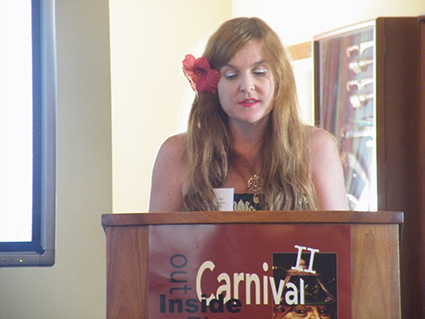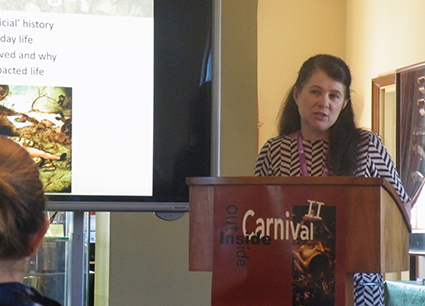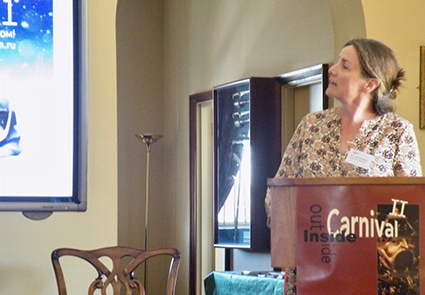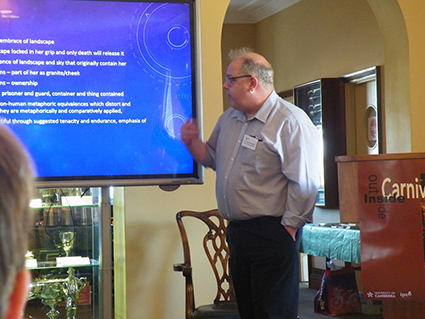Andrew Melrose, Professor of Children's Writing, and Lisa Koning, Lecturer in Creative Writing, report on Inside/Outside: Carnival II, the poetry and prose symposium exploring the theme of 'carnival' hosted in Winchester at the end of June.
Bakhtin says: "It is a world of constant reinvention and renewal."
Melding the poetics of word and image, the world unmasked reveals both the beauty and the grotesque in juxtaposition: but which is which?
Following on from last year's poetry and prose Inside/Outside symposium on 27 June 2017, we returned once again to Winchester and the theme of Carnival - this time with a focus on word and image, the beautiful and the grotesque.
A joint collaboration between the University of Canberra, the International Poetry Studies Institute, and the University of Winchester, this year's symposium was very much an international occasion with 17 speakers from eight different institutions from Australia, the US and the UK. The event was held at the Gurkha Museum in the Peninsula Barracks in Winchester; a beautiful setting with an added bonus of the scent of lavender to accompany a hot summer's day.
The event opened with Professor Alec Charles, Dean of the Faculty of Arts, University of Winchester, reminding us that it is the eruption of carnivalesque laughter that breaks societal boundaries and turns the world inside out and outside in.
The first panel of Carnival II immediately took us into the world of the carnivalesque. (This term characterises writing that depicts the temporary reversal of power structures, as happens in traditional forms of carnival celebrations). Professor Paul Hetherington (University of Canberra) provided a fascinating discussion on the sometimes surreal effects of prose poetry; Professor Katharine Cole (University of Utah) had us rethinking whether we could really believe what we believe when it comes to the beauty of strangeness; and Associate Professor Cassandra Atherton (Deakin University) provided a thought-provoking presentation on prose poetry and its ability to capture the rupture of nuclear warfare.

A collaboration between Professor Michael Grenfell (University of Southampton) and Lisa Koning (University of Winchester) culminated in their joint presentation on Bourdieu and the aesthesis of Creative Writing. Using Lisa's historical novel The Dishonest Woman as a case study, they demonstrated how Bourdieu's thinking tools can be applied to the development of creative writing. This was followed by Dr Julian Stannard's (University of Winchester) talk on surrealist artist, Leonora Carrington, with a rather fitting extract from her short story My Flannel Knickers.
 The Research Student Panel included Liz Slinn, Tom Shuttleworth and Adelaide Morris, all from the University of Winchester. The panel began with a very poignant talk on the life of Philippa Slinn, accompanied by readings of her poems. Tom provided a discussion on Paul Beatty's The Sellout as an exploration of the carnivalesque's role in 21st century satire, before Adelaide shared an enlightening presentation, exploring how Bakhtinian dialogism demonstrates that ideas can pass between borders of critical and creative discourse.
The Research Student Panel included Liz Slinn, Tom Shuttleworth and Adelaide Morris, all from the University of Winchester. The panel began with a very poignant talk on the life of Philippa Slinn, accompanied by readings of her poems. Tom provided a discussion on Paul Beatty's The Sellout as an exploration of the carnivalesque's role in 21st century satire, before Adelaide shared an enlightening presentation, exploring how Bakhtinian dialogism demonstrates that ideas can pass between borders of critical and creative discourse.
After joining in with National Writing Day and an exercise led by Dr James Cole (Arts University Bournemouth), we moved onto a panel with a strong theme of catastrophe, resistance and the fight for justice. Dr Paul Munden (University of Canberra), wearing his England football t-shirt, personified the carnival theme with a presentation on Nigel Kennedy and a legendary football match. Dr David Walters and Baljit Soroya (both from the University of Winchester) followed with a lively conversation on music and stories and how these can challenge aspects of oppression. Stephen Thompson (University of Winchester) concluded the session with a discussion on his short documentary about Winston Thew and his false imprisonment.
Moving on, Mags Webster (Murdoch University) presented on Apophasis and the grotesque in the era of fake news, considering the use of denial and negation to deal with what lies beyond language. Glenn Fosbraey (University of Winchester) then turned matters upside-down with his exploration of Morrissey and how his lyrics embrace the ideas of the carnivalesque. Dr Judith Heneghan (University of Winchester) introduced her flash fiction Snegurochka before taking the snow maiden from Russian folk tales and considering her as a middle-aged woman. And Dr Vanessa Harbour (University of Winchester) presented her paper on how children's books provide mirrors and windows on the world.

The last panel for the day blended the beautiful with the grotesque, with Professor Nigel McLoughlin (University of Gloucestershire) exploring a cognitive poetic framework drawn from conceptual blending theory. Finally, Professor Jen Webb (University of Canberra) and Professor Andrew Melrose (University of Winchester) debated the plurality and polyvocality of poetry and art.
 If that wasn't enough, the carnival did not end there. The symposium was following by a pop-up poetry café at the Railway Inn, where we were treated to an evening of music, poetry and prose.
If that wasn't enough, the carnival did not end there. The symposium was following by a pop-up poetry café at the Railway Inn, where we were treated to an evening of music, poetry and prose.
This is slowly becoming a must-attend event in the conference and symposium calendar and we are already looking to expand upon it next year. In the meantime, check out the journal Axon: Creative Explorations. Last year's symposium has been published here and this year's will in time, so keep an eye out for it.
Back to media centre